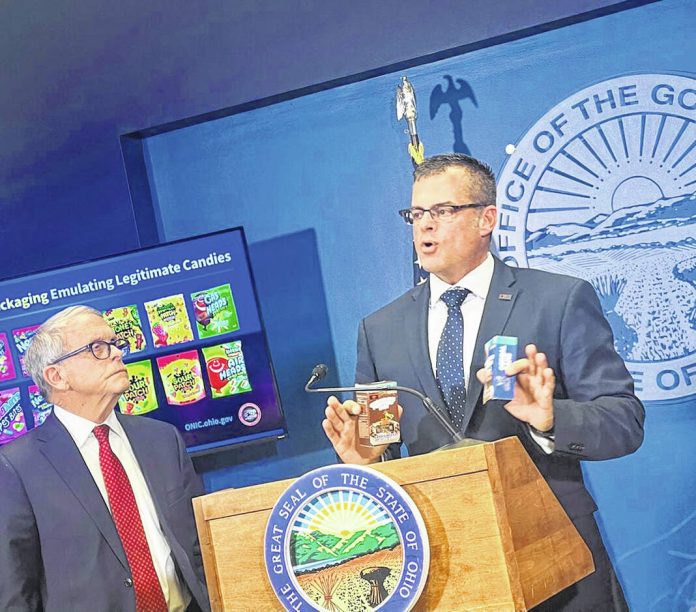
Ohio Department of Public Safety Director Andy Wilson, at the podium, and Gov. Mike DeWine, left, talk about delta-8 THC products for sale at grocery stores, gas stations, other retailers on Jan. 17, 2024. Wilson is holding THC products he said teens were able to purchase.
Laura Hancock/cleveland.com
COLUMBUS, Ohio – Gov. Mike DeWine on Wednesday again called on the legislature to remove delta-8 and delta-9 THC products from gas stations, head shops, health food stores and other locations – saying too many retailers are selling them to teens.
Hemp and marijuana come from the same species of the cannabis plant. Delta-8 and delta-9 tetrahydrocannabinol gummies, candies and vape cartridges are considered hemp products when they contain 0.3% THC on a dry weight basis, which is how Congress defined hemp in the 2018 Farm Bill when it authorized states to start hemp programs. The Ohio General Assembly passed a law, which DeWine signed, creating a hemp program the following year.
At the time, delta-8 was a small part of hemp production. The plant naturally creates very little delta-8. But more recently, businesses have figured out how to create synthetic delta-8 from CBD, or cannabidiol, a natural part of the hemp plant that has its own medicinal properties but does not create a “high” feeling. Products containing delta-8 have exploded onto the marketplace, and are technically legal, as long as they contain 0.3% THC, said Gary Wenk, an emeritus professor of behavioral neuroscience at Ohio State University.
But DeWine wants them regulated because he said it’s too easy for them to get into the hands of kids, who can get high.
During a press conference at his downtown Columbus office on Wednesday afternoon, DeWine said he would prefer the gummies, candies and vape cartridges to be completely removed from the marketplace. But he would also support ideas, such as Ohio House Bill 86, that would require most of the products to be sold exclusively in marijuana dispensaries.
Ohio Department of Public Safety Director Andy Wilson said during the press conference that his 15-year-old nephew, as well as the nephew’s friend, also 15, have shopped for delta-8 products at stores over the past several months. They’ve been able to purchase them more than once. Stores in some cases asked the boys for their IDs, he said, but sold to them anyway when they said they didn’t have them.
Over the summer, as he started to become aware of how common the products have become, DeWine assembled a task force to consider the problem of delta-8 products getting into the hands of teens, whose brains are still developing. DeWine also asked his attorneys to study the issue, and they told him there wasn’t anything he could do to regulate it.
The task force ended with the conclusion that the issue should be addressed through legislation. In addition to SB 86, state Sen. Stephen Huffman, a Dayton-area Republican, is working on a standalone bill that would also send the products to dispensaries.
“Frankly, we always hesitate to do a press conference like this,” DeWine said. “Because in one sense we’re telling more people that, ‘Hey, this product is out there.’ But I made the decision to get some action from the state legislature as well.”






